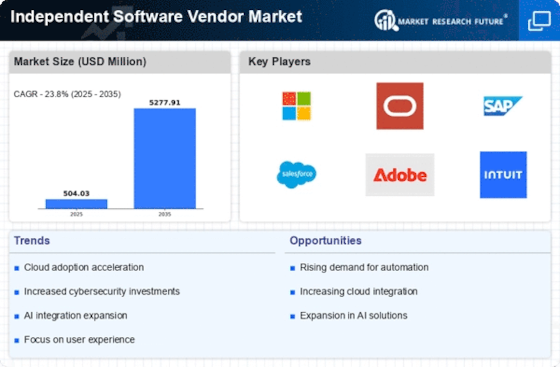Market Share
Independent Software Vendors Market Share Analysis
In the dynamic landscape of the Independent Software Vendors (ISVs) market, market share positioning strategies help determine the success and sustainability of these vendors. ISVs independently develop and sell software products, catering to various industries and customer segments. To gain a larger competitive share and enhance their market share, ISVs deploy a range of strategic approaches. One prominent strategy employed by ISVs is product differentiation.
In a crowded marketplace, standing out is crucial. ISVs aim to create unique software solutions that address specific customer needs or offer innovative features. By developing products that outshine competitors in functionality, user interface, or performance, ISVs can attract a larger customer base and solidify their market share. This strategy emphasizes the importance of continuous innovation and staying ahead of technological trends. Collaboration and partnerships also play a significant role in market share positioning for ISVs. By forging alliances with other businesses, such as technology integrators or industry-specific players, ISVs can expand their reach and access new customer segments. Collaborative efforts often result in joint solutions that provide comprehensive offerings to end-users, giving ISVs a competitive advantage and influencing market share positively. Strategic partnerships can also facilitate access to new distribution channels, amplifying the visibility of ISV products.
Moreover, pricing strategies are critical in the ISV market. Some vendors opt for competitive pricing to quickly capture a larger market share, especially in commoditized software segments. Others may adopt a premium pricing model, positioning their products as high-value solutions with advanced features or superior support. Strategic pricing aligns with the perceived value of the software, and ISVs must carefully balance affordability and profitability to maintain or expand their market share. Market segmentation is another key consideration for ISVs seeking effective positioning strategies. Understanding the diverse needs of different customer segments allows ISVs to tailor their products and marketing efforts accordingly. Whether targeting small businesses, enterprises, or specific industries, customization and personalization can significantly impact market share. By focusing on specific niches, ISVs can become specialists in those areas, gaining credibility and loyalty from targeted customers.
Continuous customer engagement and support are integral to successful market share positioning for ISVs. Establishing robust customer relationships, obtaining feedback, and promptly addressing issues contribute to customer satisfaction and retention. Satisfied customers are likelier to become brand advocates, influencing others in their network and contributing to positive word-of-mouth marketing. This, in turn, aids in expanding market share and building a strong brand presence.


















Leave a Comment